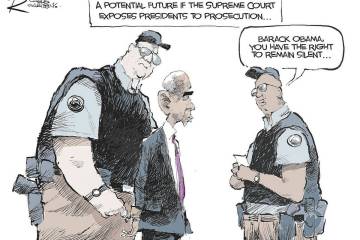RUBEN NAVARRETTE: Opinion pages shouldn’t be where curiosity goes to die
There are things they don’t teach you in journalism school. Or so I’ve been told. I got my “education” as a beat reporter and metro columnist in a major city that had more than its share of that one commodity that gins up tons of news: people behaving badly.
Here’s what I learned.
Lesson No. 1: The suits who run media companies may make their living by poking their noses into other people’s business, but they think what goes on in their shops is none of yours. They supervise newsrooms that expose the blemishes of public figures. Yet, because media is a small world, they worry about protecting their image and reputation. Thus, when journalists — reporters, anchors, producers, columnists etc. — exit the building, they’re supposed to keep their mouths shut. These storytellers are taught to keep their own stories to themselves.
Fifteen years ago, I left one newspaper to take a job with another. On my last day, the publisher asked me for a favor. “If you speak about us, and your time here, please be kind,” he said with a nervous smile.
Smart guy. As the only Latino on the editorial board, and only the second in the paper’s history, my experience was not one big fiesta.
It’s a disservice to the profession that many journalists take their best stories to the grave. Maybe Big Media wouldn’t have such big problems if they allowed employees, and former employees, to speak their minds. Sunlight is the best disinfectant.
That’s why the resignation letter of Bari Weiss — a now former writer and editor for the opinion department of The New York Times — is so epic. It doesn’t just say what so many of us would like to say on our way out the door. It’s also an autopsy, explaining in powerful language what killed opinion journalism at once great newspapers like the Grey Lady.
Weiss wrote in her letter that she was hired by Times publisher Arthur Gregg (A.G.) Sulzberger to showcase “first-time writers, centrists, conservatives and others who would not naturally think of The Times as their home.”
The experiment was doomed to fail. The worker ants decided they should have a voice too, and they believed that — because their voices had the added benefit of being progressive — what they had to say was more important than whatever anyone else could offer.
In her letter to Sulzberger, Weiss noted: “a new consensus has emerged … that truth isn’t a process of collective discovery, but an orthodoxy already known to an enlightened few whose job is to inform everyone else.” She went on: “Stories are chosen and told in a way to satisfy the narrowest of audiences, rather than to allow a curious public to read about the world and then draw their own conclusions.” Then came the hammer: “The truth is that intellectual curiosity — let alone risk-taking — is now a liability at The Times.”
Not only are the thought police at the so-called paper of record not interested in hearing the other side of an argument, they feel it is their solemn duty — as the most “woke” people to ever walk Earth — to assert that, guess what, there is no other side.
And since they’re the most enlightened people in the room, they have no qualms about also being the nastiest. Weiss wrote that she was subjected to “constant bullying by colleagues who disagree with my views.” About these cretins, she wrote, “They have called me a Nazi and a racist; I have learned to brush off comments about how I’m ‘writing about the Jews again.’”
As someone who has long been scolded by readers for writing about the Mexicans again, I get it.
While Weiss’ bosses were cowards who failed to defend her, she said some of them did commend her courage. It’s a shame that she needed defending.
“Showing up for work as a centrist at an American newspaper should not require bravery,” she wrote.
Sadly, it does. The woke mob even has its own verb: “two-side.” As in: “We shouldn’t ‘two-side’ police violence.” Or affirmative action, abortion, gun control, wearing masks, or any issue.
Gather around, children. Once upon a time, in American journalism, there used to be a place where we hashed out divergent views. The hope was that exposing readers to all sides would help them understand in full the crucial issues of the day.
That place was sacred to me for the three decades that I made it my home. It was called the op-ed page. May it rest in peace.
Contact Ruben Navarrette at ruben@rubennavarrette.com. His daily podcast, “Navarrette Nation,” is available through every podcast app.





























